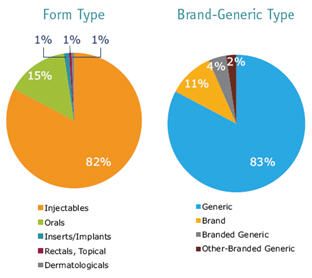Article
IMS: Drug Shortages Highly Concentrated
Author(s):
New report finds cancer drugs and generic injectables are scarcest, calls for early warning system to prevent shortages from disrupting patient care.
New report finds cancer drugs and generic injectables are scarcest, calls for early warning system to prevent shortages from disrupting patient care.
On the heels of President Obama’s decree ordering the FDA to reduce drug shortages, a new report from IMS Health sheds light on the magnitude of the drug shortages problem, which is more concentrated than previous figures suggest and affects generic injectables disproportionately.
Shortages are worst among a handful of 75 medicines, IMS reported in “Drug Shortages,” its analysis of the product types, manufacturers, and supply volatility of the 168 drugs deemed scarce by the FDA and the American Society of Health-System Pharmacists (ASHP). Supply for these 75 medicines has declined more than 20% in recent months, compared with a 3-year baseline period ending in August 2009.

Source: IMS Health, drug shortages by form and type
For 56 of the shortage products, supply is considered generally stable, having fluctuated no more than 20% in recent months compared with baseline. Another 31 scarce drugs have seen supply increases of more than 20% during the same period, IMS analysts reported. Despite these numbers, however, volatility remains a concern--even for products that are, on average, stable or growing in supply.
Manufacturers of so-called stable products are still experiencing sharp swings in supply, according to IMS Executive Director Murray Aitken. “There’s volatility happening both at the [product] level, and there’s also volatility occurring beneath the surface as we see supply moving from one manufacturer to another,” Aitken explained in a webinar on the findings.
That shortage products typically have only 1 or 2 suppliers compounds the problem, he noted. Without a support network of multiple manufacturers, a single halt in production can shut down the entire supply chain. IMS found that more than half (51%) of the 168 products have fewer than 3 suppliers, and 13 manufacturers have discontinued shortage products in the past 2 years.
Scarcity of generics, cancer drugs affects patients
Generic injectables account for more than 80% of all shortages, which tend to be concentrated in a few specific disease areas, IMS reported. A majority of the 168 shortage products fall into 5 therapeutic categories:
- Oncology agents (16%)
- Anti-infectives (15%)
- Cardiovascular drugs (12%)
- Central nervous system medicines (11%)
- Pain management therapies (5%)
Given the prevalance of diseases these drugs are used to treat, the impact of shortages on patients is significant and growing. The oncology agents alone affect care for the estimated 550,000 cancer patients who rely on them for treatment. In the 13 states where supply of injectables has fallen by more than 30%, treatment protocols are likely to be disrupted, according to IMS.
To prevent further disruptions, the agency urged FDA and stakeholders from the health care industry to establish an early warning system for shortages. Key elements of a that system would include risk evaluation, demand forecasting, a volatility index, and predictive modeling, according to Aitken.
“Only with these elements in place can the FDA, pharmacists, manufacturers, and other stakeholders bring about the structural improvement needed to the supply chain for important medicines,” Aitken said. “Only then will patients have the assurance that their treatment will not be disrupted as a result of drug shortages.”
For other articles in this issue, see:
- Screening Kids for High Cholesterol
- Medco Plans to Block Generic Lipitor






